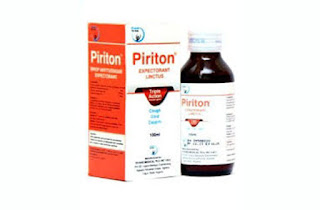Evans Piriton Expectorant Linctus (Children) Composition, Dose, Use, Side Effect
Evans Piriton expectorant linctus is a pleasantly flavored and effective mixture which will generally combat any allergic symptoms in addition to loosening the bronchial secretions thus facilitating breathing. It is manufactured by Evans Baroque Limited, Ogun State, Nigeria.
 |
| Evans priton expectorant |
Composition Of Evans Piriton Expectorant Linctus
Each 5 ml teaspoonful of the syrup contains Chlorpheniramine maleate BP 2mg, Ammonium Chloride BP 100mg and Sodium citrate BP 44mg.
Composition Of Evans Piriton expectorant linctus For Children
Each 5 ml teaspoonful of the syrup contains Chlorpheniramine maleate BP 1mg, Ammonium Chloride BP 50mg and Sodium citrate BP 20mg.
Indications Of Evans Piriton Expectorant Linctus
Piriton expectorant linctus is indicated for use in upper respiratory tract infections including the common cold and bronchitis.
Read Also: All about shaltoux cough mixture
Dosage Of Evans Piriton Expectorant Linctus
-Children (6-12 years): One teaspoonful (5ml) three to four times daily
-Adults 12 years and above): One to two teaspoonfuls (5-10ml) three to four times daily
- or as directed by your physician.
Dosage Of Evans Piriton expectorant linctus For Children
- Children, 1-6 years: One teaspoonful (5ml), three to four times daily
- Children, 6-12 years: Two teaspoonfuls (10ml), three to four times daily
- Or as directed by your physician.
Contra-Indications
Chlorpheniramine preparations are contra-indicated in patients hypersensitive to antihistamines or any of its constituents and also in patients who have had monoamine oxidase inhibitor therapy within the previous fourteen days.
Precautions
Chlorpheniramine may cause drowsiness, dizziness, blurred vision and psychomotor impairment, which can seriously hamper the patient's ability to drive or operate machinery.
In common with other drug having anticholinergic effects, it should be used with caution in epilepsy, prostatic hyperplasia, glaucoma, hepatic disease, bronchitis, bronchiectasis, thyrotoxicosis, raised intraocular pressure, severe hypertension or cardiovascular disease and bronchial asthma.
Long term treatment with Piriton expectorant linctus increases the risk of dental caries and it is essential that adequate dental hygiene is maintained.
Pregnancy And Lactation
Piriton expectorant linctus should only be used during pregnancy when clearly needed and when the potential benefit to the mother outweighs the potential risk to the fetus.
Use by nursing mothers is not recommended because of the risk of adverse effects in the infant.
Antihistamines may inhibit lactation.
Drug Interactions
Chlorpheniramine may have an additive effect when used concurrently with hypnotics, alcohol and anxiolytics causing potentiation of drowsiness, Chlorpheniramine inhibits phenytoin metabolism and can lead to phenytoin toxicity.
Read Also: All about baby greenlin cough syrup
Side Effects Of Evans Piriton Expectorant Linctus
Side effects include sedation, inability to concentrate, lassitude, incoordination, headaches, dizziness, muscular weakness and twitching. Tinnitus, depression, irritability and nightmares infrequently occur.
Other side effects include gastro-intestinal disturbance such as dryness of the mouth, nausea, vomiting, diarrhea, abdominal pain, dyspepsia, anorexia, hepatitis palpitation, tachycardia, arrhythmia, tightness of the chest, blurred vision, urinary retention, thickening of bronchial secretions hemolytic anemia and other blood dyscrasias.
Allergic reactions including exfoliators, dermatitis, photosensitivity, skin reactions and urticaria. The effects of alcohol may be increased.
Paradoxical excitation in children and confusional psychosis in the elderly may occur.

Comments
Post a Comment
Please have your say